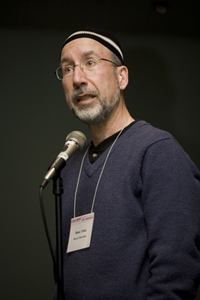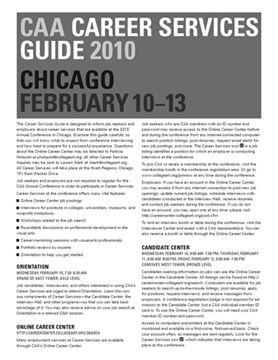CAA News Today
Voice Your Concerns at CAA’s Annual Business Meeting
posted by Vanessa Jalet — February 03, 2010
 While at next week’s Annual Conference in Chicago, be sure to attend the Annual Members’ Business Meeting on Friday, February 12, 5:15–6:15 PM. The meeting—held in Grand EF, East Tower, Gold Level, Hyatt Regency Chicago—is open to all current CAA members. CAA President Paul Jaskot will preside
While at next week’s Annual Conference in Chicago, be sure to attend the Annual Members’ Business Meeting on Friday, February 12, 5:15–6:15 PM. The meeting—held in Grand EF, East Tower, Gold Level, Hyatt Regency Chicago—is open to all current CAA members. CAA President Paul Jaskot will preside
Representatives from the Board of Directors and members of the CAA staff will review the year’s accomplishments and financial status, and the results of the 2010 board election will be announced. The board and staff will also be on hand to respond to your questions, so please come and share your insights and concerns.
Image: Blaise Tobia, professor of digital media at Drexel University, speaks at the 2009 Annual Members’ Business Meeting (photograph by Kenna Love)
Online Career Center Job Statistics
posted by Christopher Howard — February 02, 2010
Are schools mostly looking for professors of Renaissance or modern art? Does California have more teaching jobs than New York? Are there fewer open positions now compared to last year?
CAA’s Online Career Center, which publishes job classifieds in higher education and the museum world, is also an indicator of professional trends in the visual arts. In advance of next week’s Annual Conference, CAA has prepared basic statistics culled from this website, answering the questions above and giving members a sense of what job prospects might be like in Chicago and nationwide.
Using CAA’s two most recent fiscal years and the first half of the current one, this web-only article presents the total number of jobs posted in the Online Career Center, the top-ten specializations within studio art and art history, and the US states with the most open positions, among other facts. The article also compares the number of employers interviewing in Chicago to those at the Los Angeles and Dallas–Fort Worth conferences in 2009 and 2008, respectively.
Career Services Guide Published
posted by Christopher Howard — February 02, 2010
 The Career Services Guide is designed to inform job seekers and employers about career services at the 2010 Annual Conference in Chicago. The publication, which will help you navigate Career Services events and provides answers to frequently asked questions, is available now as a PDF. Study this guide carefully so that you will know what to expect from conference interviewing and how best to prepare for a successful experience.
The Career Services Guide is designed to inform job seekers and employers about career services at the 2010 Annual Conference in Chicago. The publication, which will help you navigate Career Services events and provides answers to frequently asked questions, is available now as a PDF. Study this guide carefully so that you will know what to expect from conference interviewing and how best to prepare for a successful experience.
Job candidates can review the basics of the conference employment search. Read about Orientation, the introduction to Career Services where you can ask questions, and the Candidate Center, your home base at the conference. Also, learn more about the Online Career Center, where you can search for position listings, post application materials, and arrange interviews. The guide includes tips for improving your CV, portfolio, and supplemental application materials.
Employers will find details in the guide for renting interview booths or tables as well as recommendations for posting jobs and conducting interviews at the conference. You can begin preparations now for Career Services through the Online Career Center or onsite at the Interviewer Center.
The Career Services Guide will also be published with the January 2010 issue of CAA News, and copies will be handed out at Orientation and in the Candidate’s Center. All conference Career Services will take place at the Hyatt Regency Chicago. For more information about job searching, professional-development workshops, and more, visit the Career Services section of the conference website.
Haitian Libraries and Archives Spared from Earthquake Damage
posted by Christopher Howard — February 01, 2010
The following letter comes from Brooke Wooldridge of the Digital Library of the Caribbean (dLOC). A cooperative digital library for resources from and about the Caribbean and circum-Caribbean, dLOC provides access to digitized versions of Caribbean cultural, historical, and research materials currently held in archives, libraries, and private collections.
There has been significant confusion as to the state of the four main patrimonial libraries in Port-au-Prince after the earthquake on January 12, 2010. Based on information that I have received from the Digital Library of the Caribbean partner libraries in Haiti, all four of the following library buildings are standing:
- Archives nationales d’Haïti
- Bibliothèque haïtienne des Pères du Saint-Esprit / San Martial [though the collection will need to be evacuated, as the building cannot be salvaged]
- Bibliothèque haïtienne des Frères de l’Instruction Chrétienne / Saint Louis de Gonzague
- Bibliothèque nationale d’Haïti
Importantly, the library at Saint Louis de Gonzague (FIC) was NOT destroyed. The reporter that stated the library had fallen was incorrect.
According to the director of the National Library, Mme. Francoise Thybulle, the structures must be inspected before the local staff can assess the situation and prepare detailed plans that will certainly ask for international assistance. While the buildings are standing, this does not diminish what will be the very real need for assistance once the local leadership is able to assess the situation. All of the library directors have asked that interested parties work together to help preserve the collections [and] bring these libraries/archives back into service.
Many institutions and individuals have expressed an interest in supporting the Haitian libraries/archives as they begin to rebuild. The outpouring of support and interest for the preservation of Haitian patrimony is unprecedented. Many of you are already in contact with colleagues regarding ways to help. I am trying to serve as a clearinghouse for the Haitian libraries of the different people, institutions or groups that would like to offer support to the libraries. Once I have feedback from the partner libraries in Haiti, I will share a working document of the projects I am aware of and an online survey for interested individuals to complete via www.dloc.com. Feel free to contact me personally at dloc@fiu.edu or preferably via the dLOC Facebook Group if you are already planning a project locally.
The Digital Library of the Caribbean has been working with partners in Haiti since it began in 2004. The National Archives in Haiti was a founding member of dLOC, and in the last few years we have developed strong relationships with both the National Library and the Fathers of the Holy Spirit (San Martial) Library. As more information becomes available from the local leadership, I will share it as widely as possible. I have been hesitant to send a large response until now because of the many conflicting reports. This information is confirmed, and comes from the directors of each library/archive.
As the many researchers that have worked in these four libraries know, their directors are completely dedicated to the preservation of their national patrimonial collections. All four have been fighting to preserve these collections for decades, and I am confident with support from the international community these collections will be preserved and accessible for many years to come.
Haitian Libraries and Archives Spared from Earthquake Damage
posted by Christopher Howard — February 01, 2010
The following letter comes from Brooke Wooldridge of the Digital Library of the Caribbean (dLOC). A cooperative digital library for resources from and about the Caribbean and circum-Caribbean, dLOC provides access to digitized versions of Caribbean cultural, historical, and research materials currently held in archives, libraries, and private collections.
There has been significant confusion as to the state of the four main patrimonial libraries in Port-au-Prince after the earthquake on January 12, 2010. Based on information that I have received from the Digital Library of the Caribbean partner libraries in Haiti, all four of the following library buildings are standing:
- Archives nationales d’Haïti
- Bibliothèque haïtienne des Pères du Saint-Esprit / San Martial [though the collection will need to be evacuated, as the building cannot be salvaged]
- Bibliothèque haïtienne des Frères de l’Instruction Chrétienne / Saint Louis de Gonzague
- Bibliothèque nationale d’Haïti
Importantly, the library at Saint Louis de Gonzague (FIC) was NOT destroyed. The reporter that stated the library had fallen was incorrect.
According to the director of the National Library, Mme. Francoise Thybulle, the structures must be inspected before the local staff can assess the situation and prepare detailed plans that will certainly ask for international assistance. While the buildings are standing, this does not diminish what will be the very real need for assistance once the local leadership is able to assess the situation. All of the library directors have asked that interested parties work together to help preserve the collections [and] bring these libraries/archives back into service.
Many institutions and individuals have expressed an interest in supporting the Haitian libraries/archives as they begin to rebuild. The outpouring of support and interest for the preservation of Haitian patrimony is unprecedented. Many of you are already in contact with colleagues regarding ways to help. I am trying to serve as a clearinghouse for the Haitian libraries of the different people, institutions or groups that would like to offer support to the libraries. Once I have feedback from the partner libraries in Haiti, I will share a working document of the projects I am aware of and an online survey for interested individuals to complete via www.dloc.com. Feel free to contact me personally at dloc@fiu.edu or preferably via the dLOC Facebook Group if you are already planning a project locally.
The Digital Library of the Caribbean has been working with partners in Haiti since it began in 2004. The National Archives in Haiti was a founding member of dLOC, and in the last few years we have developed strong relationships with both the National Library and the Fathers of the Holy Spirit (San Martial) Library. As more information becomes available from the local leadership, I will share it as widely as possible. I have been hesitant to send a large response until now because of the many conflicting reports. This information is confirmed, and comes from the directors of each library/archive.
As the many researchers that have worked in these four libraries know, their directors are completely dedicated to the preservation of their national patrimonial collections. All four have been fighting to preserve these collections for decades, and I am confident with support from the international community these collections will be preserved and accessible for many years to come.
Student and Emerging Professionals Committee Publishes Conference Survival Guide
posted by Vanessa Jalet — February 01, 2010
The Conference Survival Guide for the 2010 Annual Conference in Chicago was published in mid-December as a downloadable Word file. Written by CAA’s Student and Emerging Professionals Committee, the guide offers guidance to students, emerging professionals, and others attending their first conference for traveling to Chicago and navigating conference activities. Suggestions include:
- options for travel funding
- budget travel ideas and lodging information
- dining and transportation suggestions
- effective strategies for successful participation in the conference
- suggestions for networking during the four-day event
- city resources and sightseeing recommendations
For more details about the Conference Survival Guide and CAA committees, please contact Vanessa Jalet, CAA executive assistant.


